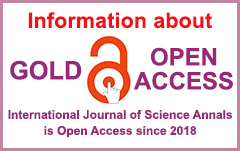Program of Psychological Rehabilitation of the National Guard of Ukraine Military Personnel Participated in Combat Actions
Prykhodko І. І.1
| 1 National Academy of National Guard of Ukraine, Ukraine |
Abstract
Background and Aim of Study: Combat actions that have taken place over the past f our years in eastern Ukraine have a negative impact on the physical and mental health of the combatants. Under these conditions, the psyche of military personnel operates on the brink of its own resources, and prolonged participation in hostilities can lead to the development of post-traumatic stress disorder. Therefore, timely measures of prevention and control of combat stress, psychological rehabilitation of military personnel after engagement in combat will significantly reduce psychogenic injuries, prevent the emergence of mental disorders from combatants. The aim of the study: to develop, scientific ally substantiate and to test a program of psychological rehabilitation of combatants.
Material and Methods: To determine the effectiveness of the program of psychological rehabilitation at the beginning and at the end was used by authorial diagnostic of mental disorders methodology “Psychological Safety of Personality”, as well as “The Questionnaire Evaluating the Effectiveness of Psychological Training” after completing the psychological training . In total, 70 military men of the National Guard of Ukraine from all regions of Ukraine participated in the program of Psychological rehabilitation, and the practical implementation and testing of the program took place in 2017.
Results: The program of psychological rehabilitation of combatants based on psychological training for restoring the psychological safety of a military man’s personality has been developed and scientifically substantiated. The practical implementation of the program of the psychological rehabilitation of the combatants proved its effectiveness: the results of the dynamics of the components of psychological safety of a person increased on average by 16%.
Conclusions: Proposed program of psychological rehabilitation of combatants helped to improve the mental condition of military personnel, to restore psychological resources of a person and to prevent the development of mental disorders.
Keywords.
prevention of mental disorders, psychological rehabilitation psychological training, military personnel, combat actions, combatants
Andrews, B., Brewin, C. R., Philpott, R., & Stewart, L. (2007). Delayed-onset posttraumatic stress disorder: A systematic review of the evidence. American Journal of Psychiatry, 164(9), 1319–1326. doi:10.1176/appi.ajp.2007.06091491
Brailey, K, Vasterling, J. J, Proctor, S. P, Constans, J. I, & Friedman, M. J. (2007). PTSD symptoms, life events, and unit cohesion in US soldiers: Baseline findings from the neurocognition deployment health study. Journal of Traumatic Stress, 20, 495–503.
Brewin, C. R, Andrews, B., Hejdenberg, J., & Stewart, L. (2012). Objective predictors of delayed-onset post-traumatic stress disorder occurring after military discharge. Psychological Medicine, 42(10), 2119–2126. doi:10.1017/S0033291712000189
Browne, T., Hull, L., Horn, O., Jones, M., Murphy, D., Fear, N. T., ... Hotopf, M. (2007). Explanations for the increase in mental health problems in UK reserve forces who have served in Iraq. British Journal of Psychiatry, 190, 484–489. doi:10.1192/bjp.bp.106.030544
Hunt, E. J. F., Wessely, S., Jones, N., Rona, R. J., & Greenberg, N. (2014). The mental health of the UK Armed Forces: where facts meet fiction. European Journal Psychotraumatology, 5(1), 23617. doi:10.3402/ejpt.v5.23617
Lefterov, V. O. (2008). Psykholohichni treninhovi tekhnolohii v orhanakh vnutrishnikh sprav [Psychological training technologies in internal affairs bodies]. Donetsk: DUI. [in Ukrainian].
Marx, B. P., Jackson, J. C., Schnurr, P. P., Nelson, M. M., Sayer, N. A., Keane, T. M., ... Speroff, T. (2012). The reality of malingered PTSD among veterans: Reply to McNally and Frueh. Journal of Traumatic Stress, 25(4), 457–460. doi:10.1002/jts.21714
Milliken, C. S., Auchterlonie, J. L., & Hoge, C. W. (2007). Longitudinal assessment of mental health problems among active and reserve component soldiers returning from the Iraq War. Journal of the American Medical Association, 298, 2141–2148.
Pasіchnik, V. І., Lіpatov, І. І., Shestopalova, L. F., Prykhodko, I. I., Moldavchuk V. S., Irkhin, Yu. B. … Stadnik, A. V. (2011). Teoriia ta praktyka psykholohichnoi dopomohy [Theory and practice of psychological help]. Kharkiv: Akademy of VV MVS of Ukraine. [in Ukrainian]
Prykhodko, І. І. (2014). Psykholohichna bezpeka personalu ekstremalnykh vydiv diialnosti (na prykladi viiskovosluzhbovtsiv vnutrishnikh viisk MVS Ukrainy) [Psychological safety of the personnel of extreme activities (for example servicemen of Internal Troops of the Ministry of Internal Affairs of Ukraine)]. Kharkiv: NUCZU. [in Ukrainian]
Prykhodko, І. І. (2015). Psykholohichni osoblyvosti sluzhbovo-boiovoi diialnosti viiskovosluzhbovtsiv Natsionalnoi hvardii Ukrainy pry provedenni antyterorystychnoi operatsii [Psychological peculiarities of service and combat activity of military service members of the National Guard of Ukraine during the antiterrorist operation]. Visnyk Kyivskoho natsionalnoho universytetu imeni T. Shevchenka. Viiskovo-spetsialni nauky – Bulletin of Taras Shevchenko National University of Kyiv. Military-Special Science, 2(33), 35–39. [in Ukrainian]
Prykhodko, І. І. (Ed.). (2017). Psykholohiia ekstremalnoi diialnosti [Psychology of extreme activities]. Kharkiv: NA NGU. [in Ukrainian]
Prykhodko, І. І., Kolesnіchenko, O. S., Matsegora, Y. V., Vorobyova, І. V., & Parkhomenko, O. O. (2014). Psykholohichnyi suprovid sluzhbovo-boiovoi diialnosti viiskovosluzhbovtsiv Natsionalnoi hvardii Ukrainy v ekstremalnykh umovakh [Psychological support of military service of servicemen of the National Guard of Ukraine in extreme conditions]. Chest i zakon – Honor and law, 3, 68–74. [in Ukrainian]
Pucelik, F. R., & Mcbee, A. J. (2017). Reality wars dissociated state therapy. Odesa: Neformat.
Rona, R. J., Jones, M., French, C., Hooper, R., & Wessely, S. (2004). Screening for physical and psychological illness in the British Armed Forces: I: The acceptability of the programme. Journal of Medical Screening, 11, 148–153.
Rona, R. J., Jones, M., Iversen, A., & Hull, L. (2009). The impact of posttraumatic stress disorder on impairment in the UK military at the time of the Iraq War. Journal of Psychiatric Research, 43(6), 649–655.
Rona, R. J., Jones, M., Sundin, J., Goodwin, L., Hull, L., Wessely, S., & Fear, N. T. (2012). Predicting persistent posttraumatic stress disorder (PTSD) in UK military personnel who served in Iraq: A longitudinal study. Journal of Psychiatric Research, 46(9), 1191–1198. doi:10.1016/j.jpsychires.2012.05.009
Sareen, J., Cox, B. J., Afifi, T. O., Stein, M. B., Belik, S.-L., Meadows, G., & Asmundson, G. J. (2007). Combat and peacekeeping operations in relation to prevalence of mental disorders and perceived need for mental health care: Findings from a large representative sample of military personnel. Archives of General Psychiatry, 64(7), 843–852. doi:10.1001/archpsyc.64.7.843
Schnurr, P. P., Lunney, C. A., & Sengupta, A. (2004). Risk factors for the development versus maintenance of posttraumatic stress disorder. Journal of Traumatic Stress, 17(2), 85–95.
Schulte-Herbruggen, O., & Heinz, A. (2012). Psychological trauma in soldiers – A challenge for the German armed forces. Deutsches Arzteblatt International, 109(35–36), 557–558.
Smith, T. C., Ryan, M. A., Wingard, D. L., Slymen, D. J., Sallis, J. F., & Kritz-Silverstein, D. (2008). New onset and persistent symptoms of posttraumatic stress disorder self reported after deployment and combat exposures: Prospective population based US military cohort study. British Medical Journal, 336, 366–371.
Solomon, Z., & Mikulincer, M. (2006). Trajectories of PTSD: A 20-year longitudinal study. American Journal of Psychiatry, 163, 659–666.
Sundin, J., Fear, N. T., Hull, L., Jones, N., Dandeker, C., & Hotopf, M. (2010). Rewarding and unrewarding aspects of deployment to Iraq and its association with psychological health in UK military personnel. International Archives of Occupational and Environmental Health, 83, 653–663.
Sundin, J., Fear, N. T., Iversen, A., Rona, R. J., & Wessely, S. (2010). PTSD after deployment to Iraq: Conflicting rates, conflicting claims. Psychological Medicine, 40, 367–382.
Sundin, J., Herell, R. K., Hoge, C. W., Fear, N. T., Adler, A. B., Greenberg, N., ... Bliese, P. D. (2014). Mental health outcomes in US and UK military personnel returning from Iraq. British Journal of Psychiatry, 204(3), 200–207. doi:10.1192/bjp.bp.113.129569
Wittchen, H.-U., Schonfeld, S., Kirschbaum, C., Thurau, C., Trautmann S., Steudte, S., … Zimmermann, P. (2012). Traumatic experiences and posttraumatic stress disorder in soldiers following deployment abroad: How big is the hidden problem? Deutsches Arzteblatt International, 109(35–36), 559–568. doi:10.3238/arztebl.2012.0559
Information about the author:
Prykhodko Ihor Ivanovich – https://оrcid.оrg/0000-0002-4484-9781; Doctor of Psychological Sciences, Professor, Chief of the Scientific and Research Center for Service and Combat Activities of the National Guard of Ukraine, National Academy of National Guard of Ukraine; Kharkiv, Ukraine.
|
|
APA
Prykhodko, І. І. (2018). Program of psychological rehabilitation of the National Guard of Ukraine military personnel participated in combat actions. International Journal of Science Annals, 1(1-2), 34–42. https://doi.org/10.26697/ijsa.2018.1-2.05
Harvard
Prykhodko, І. І., 2018. "Program of psychological rehabilitation of the National Guard of Ukraine military personnel participated in combat actions". International Journal of Science Annals, [online] 1(1-2), pp.34-42. viewed 30 November 2018, https://culturehealth.org/ijsa_archive/ijsa.2018.1.05.pdf
Vancouver
Prykhodko І. І. Program of psychological rehabilitation of the National Guard of Ukraine military personnel participated in combat actions. International Journal of Science Annals [Internet]. 2018 [cited 30 November 2018];1(1-2):34-42. Available from: https://culturehealth.org/ijsa_archive/ijsa.2018.1.05.pdf https://doi.org/10.26697/ijsa.2018.1-2.05













